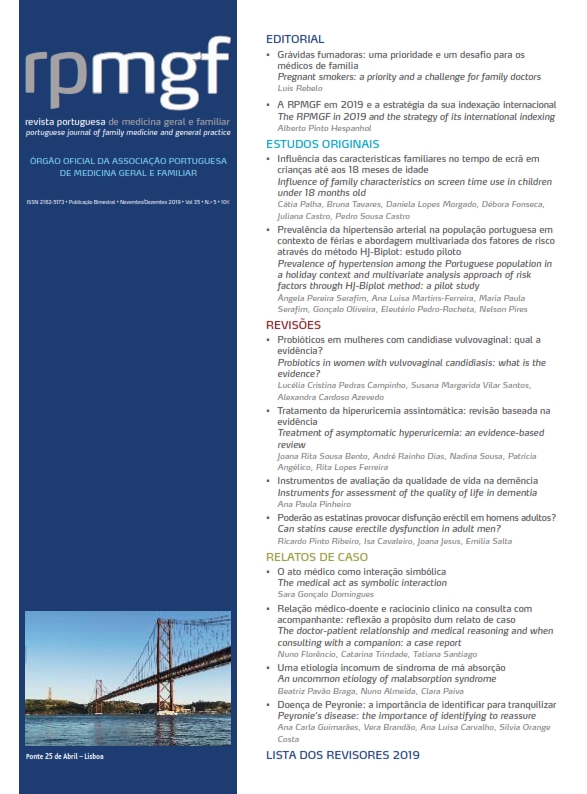Raciocínio médico na consulta com doente e acompanhante – reflexão a propósito dum caso clínico
DOI:
https://doi.org/10.32385/rpmgf.v35i6.12237Abstract
Resumo
Introdução: A presença de acompanhantes nas consultas de Medicina Geral e Familiar (MGF) é frequente, no entanto as suas implicações não estão bem estudadas. A discussão deste caso clínico tem como objetivo refletir como a presença de acompanhantes na consulta pode interferir na relação médico-doente e no raciocínio clínico.
Descrição do caso: Doente de 33 anos, estrangeiro, com agravamento da enxaqueca e crises suspeitas de epilepsia, com cerca de 2 anos de evolução. Foi estudado em internamento de Neurologia, sem diagnóstico claro. Na consulta de MGF, devido à barreira linguística, a companheira por vezes falava pelo doente e descrevia episódios compatíveis com crises epilépticas. Aprofundando efetivamente as queixas do doente, foram diagnosticadas perturbação depressiva major e perturbação de pânico. O doente respondeu favoravelmente ao tratamento, permitindo-lhe retomar a sua atividade profissional.
Comentário: A perspetiva generalista, biopsicossocial e centrada na pessoa permite ao médico de família interpretar de forma livre as queixas dos doentes. No entanto, as implicações da presença de acompanhantes no raciocínio clínico deverão ser melhor estudadas.
Palavras-chave: Relação médico-doente; raciocínio médico.
Abstract
Background: The presence of companions during General Practice consultation is frequent and it’s implications have not been thoroughly studied. The aim of this clinical report is to think over how the presence of companions may interfere in the doctor-patient relation and clinical reasoning.
Results: A foreign 33 year-old patient, presented with worsening migraine and seizure-like episodes, for about 2 years. He was extensively studied in Neurology without a clear diagnosis. In the general practicioner (GP) consultation, due to the language barrier, his girlfriend frequently spoke for him and described the seizure-like episodes. Clarifying the patient’s complaints, he was diagnosed with major depressive disorder and panic disorder. The patient responded completely to the prescribed medication and returned to work.
Conclusion: The general practice, biopsychosocial and patient centered perspective allow the GP to interpret patient’s complaints freely and without prejudices. However, the presence of companions and its impact on clinical reasiong and doctor-patient relation should be better investigated.
Keywords: Physician-Patient Relations; medical reasoning.
Downloads
Downloads
Published
Issue
Section
License
The authors will assign to the RPMGF the sole right to publish and distribute the content of the manuscript specified in this declaration via physical, electronic, broadcasting or any other medium that may come into existence. They also grant the RPMGF the right to use and exploit this manuscript, in particular by assigning, selling or licensing its content. This permission is permanent and takes effect from the moment the manuscript is submitted, has the maximum duration allowed by applicable Portuguese or international law and is of worldwide scope. The authors further declare that this assignment is made free of charge. If the RPMGF informs the authors that it is not going to publish their manuscript, the exclusive assignment of rights ceases forthwith.
The authors authorise the RPMGF (or any entity it may appoint) to act on their behalf when it believes that copyright may have been infringed.





